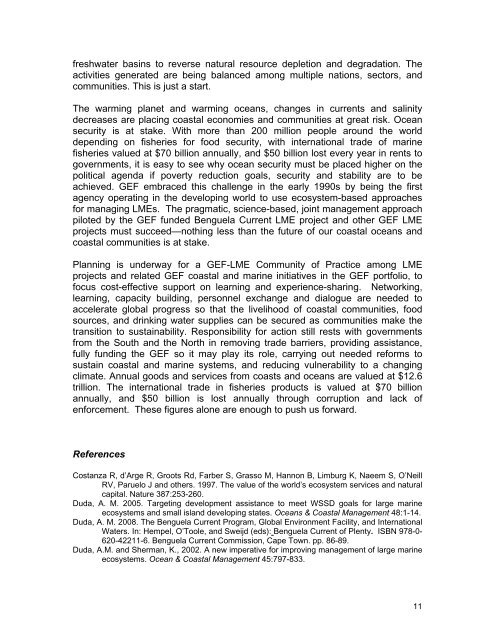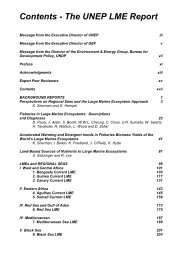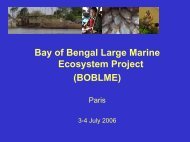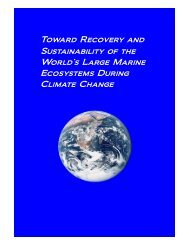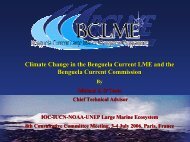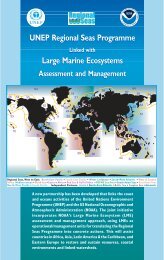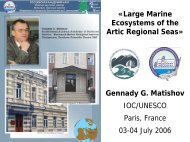Sustaining the World's Large Marine Ecosystems
Sustaining the World's Large Marine Ecosystems
Sustaining the World's Large Marine Ecosystems
You also want an ePaper? Increase the reach of your titles
YUMPU automatically turns print PDFs into web optimized ePapers that Google loves.
freshwater basins to reverse natural resource depletion and degradation. The<br />
activities generated are being balanced among multiple nations, sectors, and<br />
communities. This is just a start.<br />
The warming planet and warming oceans, changes in currents and salinity<br />
decreases are placing coastal economies and communities at great risk. Ocean<br />
security is at stake. With more than 200 million people around <strong>the</strong> world<br />
depending on fisheries for food security, with international trade of marine<br />
fisheries valued at $70 billion annually, and $50 billion lost every year in rents to<br />
governments, it is easy to see why ocean security must be placed higher on <strong>the</strong><br />
political agenda if poverty reduction goals, security and stability are to be<br />
achieved. GEF embraced this challenge in <strong>the</strong> early 1990s by being <strong>the</strong> first<br />
agency operating in <strong>the</strong> developing world to use ecosystem-based approaches<br />
for managing LMEs. The pragmatic, science-based, joint management approach<br />
piloted by <strong>the</strong> GEF funded Benguela Current LME project and o<strong>the</strong>r GEF LME<br />
projects must succeed—nothing less than <strong>the</strong> future of our coastal oceans and<br />
coastal communities is at stake.<br />
Planning is underway for a GEF-LME Community of Practice among LME<br />
projects and related GEF coastal and marine initiatives in <strong>the</strong> GEF portfolio, to<br />
focus cost-effective support on learning and experience-sharing. Networking,<br />
learning, capacity building, personnel exchange and dialogue are needed to<br />
accelerate global progress so that <strong>the</strong> livelihood of coastal communities, food<br />
sources, and drinking water supplies can be secured as communities make <strong>the</strong><br />
transition to sustainability. Responsibility for action still rests with governments<br />
from <strong>the</strong> South and <strong>the</strong> North in removing trade barriers, providing assistance,<br />
fully funding <strong>the</strong> GEF so it may play its role, carrying out needed reforms to<br />
sustain coastal and marine systems, and reducing vulnerability to a changing<br />
climate. Annual goods and services from coasts and oceans are valued at $12.6<br />
trillion. The international trade in fisheries products is valued at $70 billion<br />
annually, and $50 billion is lost annually through corruption and lack of<br />
enforcement. These figures alone are enough to push us forward.<br />
References<br />
Costanza R, d’Arge R, Groots Rd, Farber S, Grasso M, Hannon B, Limburg K, Naeem S, O’Neill<br />
RV, Paruelo J and o<strong>the</strong>rs. 1997. The value of <strong>the</strong> world’s ecosystem services and natural<br />
capital. Nature 387:253-260.<br />
Duda, A. M. 2005. Targeting development assistance to meet WSSD goals for large marine<br />
ecosystems and small island developing states. Oceans & Coastal Management 48:1-14.<br />
Duda, A. M. 2008. The Benguela Current Program, Global Environment Facility, and International<br />
Waters. In: Hempel, O’Toole, and Sweijd (eds): Benguela Current of Plenty. ISBN 978-0-<br />
620-42211-6. Benguela Current Commission, Cape Town. pp. 86-89.<br />
Duda, A.M. and Sherman, K., 2002. A new imperative for improving management of large marine<br />
ecosystems. Ocean & Coastal Management 45:797-833.<br />
11


